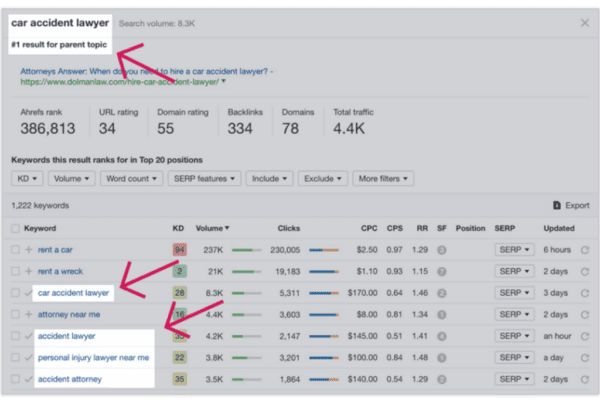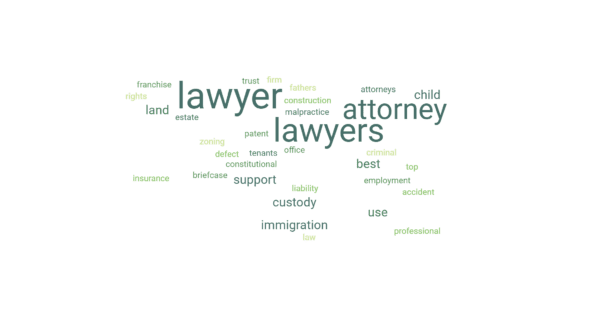Table of Contents
By Harriet Sese
Enhancing your law firm’s online presence (Optimizing your law firm’s website) is vital for attracting potential clients in the legal industry. It’s imperative to comprehend the connection between Search Engine Optimization (SEO) strategies and ranking factors to excel in law firm SEO.
Law firm SEO is the process of increasing the visibility of your law firm’s website. It is sometimes referred to as attorney SEO. A well-optimized website improves visibility and establishes credibility, making it easier for clients to find your services and trust your expertise. Keeping up-to-date with the latest SEO trends and incorporating them into your website can significantly enhance its performance and increase client engagement.

Search engines employ specific criteria, known as SEO ranking factors, to assess and rank websites in their search results. Here are six key factors that can elevate your legal website’s ranking:
- Local Search Engine Optimization
Local SEO is crucial for law firms that serve a specific geographic area. Ensuring a law firm’s website is customized for particular local searches, such as “lawyer near me,” is crucial. To accomplish this goal, begin by verifying and enhancing your Google My Business (GMB) profile with precise details and favourable customer feedback.
When displaying local results, Google prioritizes relevance, distance, and prominence. Hence, to optimize your law firm SEO, your focus should be on creating relevant content targeting your nearby geographic area and establishing your firm as an authoritative presence.

Link Building
Additionally, local link-building is crucial for boosting SEO. Seek links from and to local sources, and consider applying for local awards to enhance your firm’s visibility. Engaging with the community through partnerships and volunteering can also be highlighted on your website, to showcase your involvement with respected organizations in the area.
NAP
Consistency in your law firm’s name, address, and phone number (NAP) across your website, local directories, and online listings within specific geographic regions in Kenya is critical to effectively leveraging local SEO strategies.
- Relevant keywords
keywords hold significant importance in SEO ranking. Users input these specific words and phrases into search engines like Google and Bing. For law firm SEO, your website should rank for many keywords directly linked to your legal practice areas to enhance your online presence. The objective is to show up on Search Engine Results Pages (SERPS) when prospective clients look for different keyword combinations related to your legal knowledge.

There are two primary categories of keywords to consider: short-tail keywords, which are concise and general, and long-tail keywords, which are more specific and detailed. Understanding the intent behind users’ searches enables you to create content that precisely meets their needs. The more tailored your content is, the better the user experience, which is crucial for law firm SEO ranking on Google.

Simply put, relevance and user experience (UX) are paramount in Google’s algorithm. By comprehending what users are searching for and why, you can create content that aligns with their interests, improving their experience on your website. For law firm SEO and the intricacies of surviving the online marketing landscape, selecting the appropriate keywords is akin to solving a crucial puzzle. Opting for the right keywords is vital; a misstep could result in wasted effort and resources without achieving the desired outcomes.
- High-value/quality content
There is a direct relationship between high-quality content and improved SEO. Providing accurate and concise information is crucial when looking to optimize your law firm’s SEO by addressing legal issues and answering frequently asked questions. Navigating the complexities of legal issues requires simplifying intricate concepts into clear, understandable language. This method guarantees that legal information is easily understandable for a broad audience, making your content valuable.
Incorporating relevant keywords naturally into the content is vital for search engine optimization without compromising readability or user experience. Integrating these keywords makes the content more discoverable to individuals seeking specific legal information online, thereby driving traffic to your website and who knows, you will possibly increase conversions.
How to provide High-quality and Valuable for Law Firm SEO
Demonstrate your expertise: it begins by providing detailed explanations of everyday legal problems to showcase expertise. Such can include personal injury claims, family law disputes, employment issues, or estate planning concerns. By delving into these subjects, the audience gains valuable insights and understanding, empowering them to make informed decisions when faced with similar situations.
Common legal challenges: addressing common legal challenges in different areas of law, such as criminal law, immigration, or business law, enhances the content’s relevance and appeal to diverse readers. By doing so, the content becomes a comprehensive resource, catering to various legal needs and interests.

Provide citations: citing relevant case studies, real-life examples, or recent legal developments can add depth and authenticity to the content. These examples illustrate critical points and provide practical context, making the information more relatable and engaging for the readers.
Provide structured content: structuring the content logically with clear headings and subheadings enhances readability and allows readers to navigate the information effortlessly. Coherently organizing the content makes it easier for the audience to find answers to their specific queries, ensuring a positive user experience.
- Website technical fixes
Improving a website’s technical aspects, often called Technical Search Engine Optimization (SEO), is essential for enhancing its visibility and organic search rankings. Optimizing various backend elements ensures efficient search engine crawling and indexing. Here are some key points to focus on while addressing technical fixes:
Technical SEO
Aims to enhance search engine understanding of your website’s structure and content. Key areas of focus include:
Website Speed Optimization: reduces loading times by optimizing code and minimizing resource-heavy elements.
Mobile-Friendliness: utilizes responsive design to ensure the website adapts seamlessly to different devices and screen sizes.
XML Sitemaps: lists all the essential pages of your website so that search engines can effectively crawl and find them to reduce bounce rates and increase user engagement.
Site Security (HTTPS): enhances user trust and site security, a factor search engines consider in rankings.
Site Structure and Navigation: organizes content logically and creates an intuitive navigation system for easy user access.
Crawl Error Fixing: identifies and resolves crawl errors to prevent search engine indexing issues.
Mobile Optimization for Legal Websites
Mobile optimization is vital for providing a seamless user experience. Consider the following tips:
Responsive Design: ensures the website layout and content adjust automatically based on the user’s device screen size.
Mobile-Friendly Content: use clear headings, concise paragraphs, and bullet points for readability on smaller screens.
Image Optimization: compress images to reduce file sizes, enhancing loading speed on mobile devices.
Easy Navigation: simplify the menu structure, preferably using a hamburger menu, for effortless user navigation.
Forms Optimization: optimize forms for mobile users, employing large, easily selectable input fields and minimizing required fields for a streamlined user experience.
Page Speed Optimization
Page speed is crucial for a positive user experience and website performance. Optimize page speed with these strategies:
Minimize HTTP Requests: reduce the number of page elements (images, scripts, stylesheets) to minimize HTTP requests and enhance loading speed.
Enable Compression: use tools like Gzip to compress large files, reducing response size and speeding up loading time.
Image Optimization: compress images and choose appropriate file formats (JPEG, PNG, WebP) to maintain quality while minimizing file sizes.
By implementing these technical fixes and optimizations, your website can achieve better visibility, accessibility, and overall SEO performance.
- Links
Acquiring backlinks from external websites is integral to improving law firm SEO. These links serve as endorsements to Google, indicating the worthiness and usefulness of your website to users. The significance of backlinks in SEO is twofold.
The first aspect concerns rankings. The more backlinks your web pages accumulate, the higher the likelihood of ranking well for relevant search queries. A robust backlink profile enhances your visibility in search results.
The second is discoverability. Search engines prioritize popular pages for frequent updates. Backlinks from such pages allow more users to find your content, which zeroes back to improving your law firm SEO. When authoritative websites link to your page, Google deems it credible and elevates its position in search results.

Hence, link-building, however complex, is pivotal for law firm SEO. Implementing strategies like creating high-quality content, guest blogging, providing testimonials, obtaining backlinks from forums, Q&A platforms, and comments, and incorporating links in podcasts, videos, and webinars can significantly enhance your website’s visibility.
For law firms, securing high-quality backlinks from reputable sources is imperative. These backlinks showcase the value of your content to Google and offer an additional pathway for users to discover your online presence. By garnering backlinks, your website gains recognition as a credible and authoritative source, improving its search engine rankings.
- User experience
Certainly, optimizing user experience (UX) is crucial for law firms aiming to improve their SEO. Law firms can boost their online visibility through strategic digital marketing efforts, such as search engine optimization, social media engagement, and creating informative legal content to attract a larger audience and potential clients.
Clear and concise navigation ensures visitors can quickly find the information they seek. High-quality images and videos, on the other hand, improve visual appeal and optimize your law firm’s website. Incorporating user-friendly design elements, such as intuitive forms and responsive layouts, further enriches the overall user experience, ultimately boosting the firm’s visibility and credibility in the digital space.
Summary Law Firm SEO Essentials:
Local SEO
- Claim and optimize Google My Business (GMB) profile with accurate info and positive reviews.
- Focus on relevance, distance, and prominence in local searches.
- Further, engage with the community, build local links, and maintain consistent NAP details.
Keywords
- Target both short-tail and long-tail keywords related to legal expertise.
- Create tailored content based on user intent for a better user experience.
- Select keywords carefully to avoid wasted efforts and resources.
High-Quality Content
- Provide accurate and concise information on legal topics.
- Incorporate relevant keywords naturally without compromising readability.
- Use clear headings, subheadings, and examples for a comprehensive and engaging user experience.
Website Technical Fixes
- Optimize website speed, mobile-friendliness, XML sitemaps, site security, and navigation.
- Address crawl errors and focus on mobile optimization for a seamless user experience.
- Optimize page speed by minimizing HTTP requests, enabling compression, and optimizing images.
Links
- Acquire backlinks from reputable sources to enhance visibility and credibility.
- Focus on creating high-quality content, guest blogging, providing testimonials, and obtaining backlinks from various platforms.
- Securing backlinks from authoritative websites is essential to improve search engine rankings.
User Experience
- Focus on easy navigation, visually appealing designs, and engaging content.
- Use intuitive forms and responsive layouts to enrich the user experience.
- Enhance overall user experience to boost visibility and credibility in the digital landscape.
Conclusion
Law firm SEO requires a comprehensive approach encompassing various vital factors. Local SEO strategies, relevant keywords, high-quality content, technical fixes, backlinks, and user experience are fundamental in enhancing your website’s visibility and credibility in today’s competitive digital landscape.
By understanding the intricacies of these factors and implementing effective strategies, your law firm can improve its search engine rankings, as well as attract and engage potential clients, which will help you establish a solid online presence in the legal industry.







